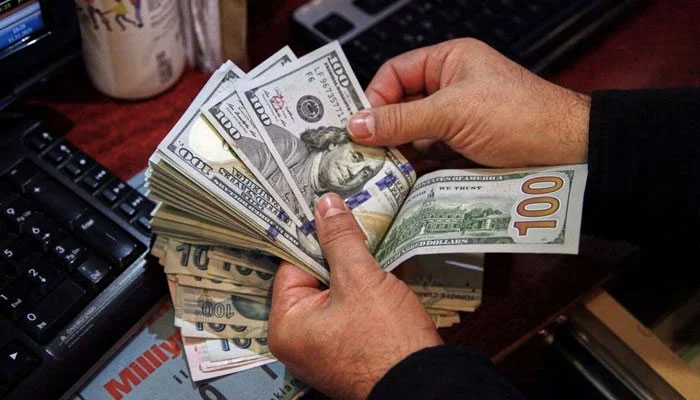Alarm as SBP reserves drop below $3bn
Pakistan’s foreign exchange reserves held by SBP decreased by 5.5 percent or $170 million to $2.91 billion
KARACHI: Pakistan’s foreign exchange reserves held by the central bank decreased by 5.5 percent or $170 million to $2.91 billion in the week ending February 3, the State Bank of Pakistan said on Thursday, deepening the economic woes of the crisis-stricken country.
The country has $8.54 billion in reserves in total, including $5.62 billion held by commercial banks.
The country is struggling to service extremely high levels of external debt, and has barely enough dollars to cover less than three weeks worth of imports.
The nation’s already precarious economic predicament was made worse by the rapidly decreasing reserves. Pakistan held talks with the IMF to obtain assistance for containing a growing financial crisis that was made worse by a lack of foreign currency and skyrocketing inflation.
After 10 days of negotiations with the government aimed at releasing crucial foreign funding, the IMF delegation is scheduled to depart the country on Thursday.
The rupee recently fell to historic lows after the government, in an attempt to meet IMF lending conditions, lifted currency controls that had been artificially supporting the currency.
Pakistan is dealing with a serious array of issues. Tens of millions of people were harmed by flooding last year, which cost $30 billion in damages. The country has been negatively impacted by inflation, the impact of Russia’s war in Ukraine on food and energy prices and political uncertainty, of course.
Pakistan has long-standing issues with its balance of payments. The government is hoping that it will quickly reach an agreement with the IMF mission over the terms of its $6.5 billion lending programme to unlock crucial funding from the IMF this time. But even if a loan tranche of $1 billion is unfrozen, this is only a bandage. More amounts are required if Pakistan is to avoid default.
Economists agree that debt restructuring or reprofiling is essential for the country to avert default.
“Pakistan is entrapped in an external debt trap. The classic definition of a debt trap is when a country needs to borrow continuously at an increasing scale to meet its existing debt liabilities in order to avoid a debt default,” Dr Muhammad Yaqub, the former SBP governor, said.
Pakistan’s existing debt mostly consists of public debt to bilateral countries and multilateral institutions like the World Bank, IMF, Asian Development Bank, and Islamic Development Bank. Most of the multilateral institutions refuse to give debt relief and have made it clear that they will not restructure their debt for any country, he said.
“If Pakistan seeks debt relief only from bilateral countries, they will have to give massive debt relief by restructuring their debt on very liberal terms if they want to help the country get out of its debt trap,” he added.
-
 Czech Republic Supports Social Media Ban For Under-15
Czech Republic Supports Social Media Ban For Under-15 -
 Prince William Ready To End 'shielding' Of ‘disgraced’ Andrew Amid Epstein Scandal
Prince William Ready To End 'shielding' Of ‘disgraced’ Andrew Amid Epstein Scandal -
 Chris Hemsworth Hailed By Halle Berry For Sweet Gesture
Chris Hemsworth Hailed By Halle Berry For Sweet Gesture -
 Blac Chyna Reveals Her New Approach To Love, Healing After Recent Heartbreak
Blac Chyna Reveals Her New Approach To Love, Healing After Recent Heartbreak -
 Royal Family's Approach To Deal With Andrew Finally Revealed
Royal Family's Approach To Deal With Andrew Finally Revealed -
 Super Bowl Weekend Deals Blow To 'Melania' Documentary's Box Office
Super Bowl Weekend Deals Blow To 'Melania' Documentary's Box Office -
 Meghan Markle Shares Glitzy Clips From Fifteen Percent Pledge Gala
Meghan Markle Shares Glitzy Clips From Fifteen Percent Pledge Gala -
 Melissa Jon Hart Explains Rare Reason Behind Not Revisting Old Roles
Melissa Jon Hart Explains Rare Reason Behind Not Revisting Old Roles -
 Meghan Markle Eyeing On ‘Queen’ As Ultimate Goal
Meghan Markle Eyeing On ‘Queen’ As Ultimate Goal -
 Japan Elects Takaichi As First Woman Prime Minister After Sweeping Vote
Japan Elects Takaichi As First Woman Prime Minister After Sweeping Vote -
 Kate Middleton Insists She Would Never Undermine Queen Camilla
Kate Middleton Insists She Would Never Undermine Queen Camilla -
 King Charles 'terrified' Andrew's Scandal Will End His Reign
King Charles 'terrified' Andrew's Scandal Will End His Reign -
 Winter Olympics 2026: Lindsey Vonn’s Olympic Comeback Ends In Devastating Downhill Crash
Winter Olympics 2026: Lindsey Vonn’s Olympic Comeback Ends In Devastating Downhill Crash -
 Adrien Brody Opens Up About His Football Fandom Amid '2026 Super Bowl'
Adrien Brody Opens Up About His Football Fandom Amid '2026 Super Bowl' -
 Barbra Streisand's Obsession With Cloning Revealed
Barbra Streisand's Obsession With Cloning Revealed -
 What Did Olivia Colman Tell Her Husband About Her Gender?
What Did Olivia Colman Tell Her Husband About Her Gender?




